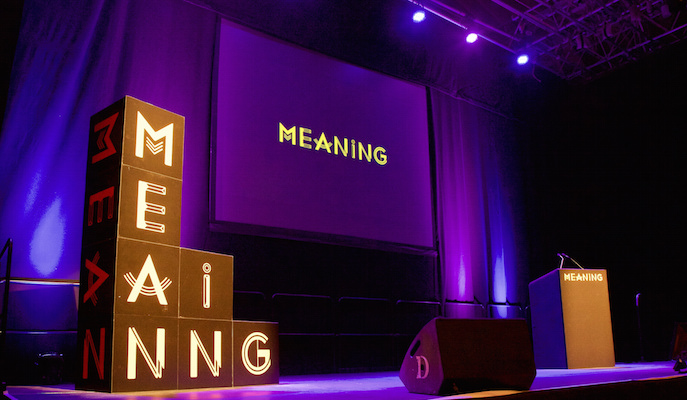Blog
Our highlights of Meaning 2015

Last week our co-founders Steve Fuller and Graham Massey made their annual trip to the Meaning conference in Brighton. As always it’s difficult to pick the highlights from such a wonderful array of inspiring speakers and presentations, but these were some of Steve and Graham’s favourites:
Miriam Turner, Interface
Steve: “Interface’s story was a huge influence on our decision ten years ago to change our business to focus on purpose. In 1994, CEO Ray Anderson realised that the carpet tile business had a terrible environmental footprint and adopted “Mission Zero” with the audacious goal of having no negative impact by 2020.
As Assistant Vice President of Co-Innovation (what a great title!), Miriam explained how innovation on this scale can only be achieved by taking a innovative approach to innovation itself. This means more open, collaborative and partnership-driven approach.
A really inspiring example of this is Interface’s Net-Works programme. Interface partnered with nylon producer Aquafil, the Zoological Society of London and Danajon Bank of the Philippines to create an inclusive community enterprise network based around the recycling of discarded fishing nets.
Coastal communities in the Philippines collect and sell old nets to Aquafil and Interface, who turn them into carpet tiles. On top of this, Net-Works created a system of community banks that allow locals to save the additional income they make from collecting nets – this also made them more resilient in the face of the devastation caused by Typhoon Haiyan. And of course, the nets are no longer putting sea life in harm’s way.
Jos de Blok, Buurtzorg
Graham: “Jos de Blok’s ideas could revolutionise how we think about the way we build and grow organisations. His organisation Buurtzorg has created an entirely new way of providing home-based medical care in the Netherlands, stripping away unnecessary hierarchy and taking the administrative burden off of nurses.
It’s a model that gives the nurses the autonomy and tools to work to their highest ability, by embedding them in the community and encouraging a collaborative relationship between nurse and patient.
It’s not hard to see how this philosophy could be applied more widely outside of the healthcare system. At its core, it’s about focusing on what you are really trying to do and stripping down everything that’s secondary.”
Read more about Buurtzorg here.
James Vaccaro, Triodos Bank
Steve: “We’ve spent a lot of time thinking about purpose and financial services lately so it was inspiring to hear James share his views on how the sector could reinvent itself. There’s a massive opportunity for banks to refocus on the “social life of money” and how money and finance really fit into our lives, and use that insight to forge a much more emotional and purposeful connection with customers.
James’ call for financial institutions to think and act creatively, in part by enhancing the traditional conceptions of risk and return, was a refreshing message to hear from a sector that is not normally associated with purpose and meaning. We’re optimistic that change is afoot.”
Jaideep Prabhu, Cambridge University
Graham: “Jaideep is the co-author of Frugal Innovation – How To Do More With Less, which questions the dominant ‘big-budget’ approach to innovation and R&D. Instead, Jaideep draws on the experience of how managers and engineers in emerging markets create value and innovation while working within tight resource constraints.
Jaideep introduced us to the concept of “Jugaad” – a slang term used in India to describe a clever fix or innovative work-around. One example that stood out was GE Healthcare’s Lullaby baby-warmer, invented in Bangalore. It’s a stripped-down version of a baby incubator for premature babies that consumes less energy and is more affordable for hospitals in the developing world. Another was the MittiCool Fridge, made of clay and not requiring any electricity to run.
All of the examples he shared showed how taking a frugal approach can open our eyes to much more resource-efficient and environmentally-friendly products and services.”
Annette Mees, artist
Steve: “Annette describes herself as a ‘radical optimist’ so there was no way we weren’t going to get along! For her latest project she’s been speaking to 15-year-olds and 65-year-olds from around the world to create an ‘Almanac of the Future’, looking back at the past 50 years and ahead to the next.
It’s such a simple concept that packs in so much humanity and hope. This kind of creative insight and inspiration is one of the reasons we go to Meaning each year.”
Image: Meaning Conference (used under Creative Commons licence)